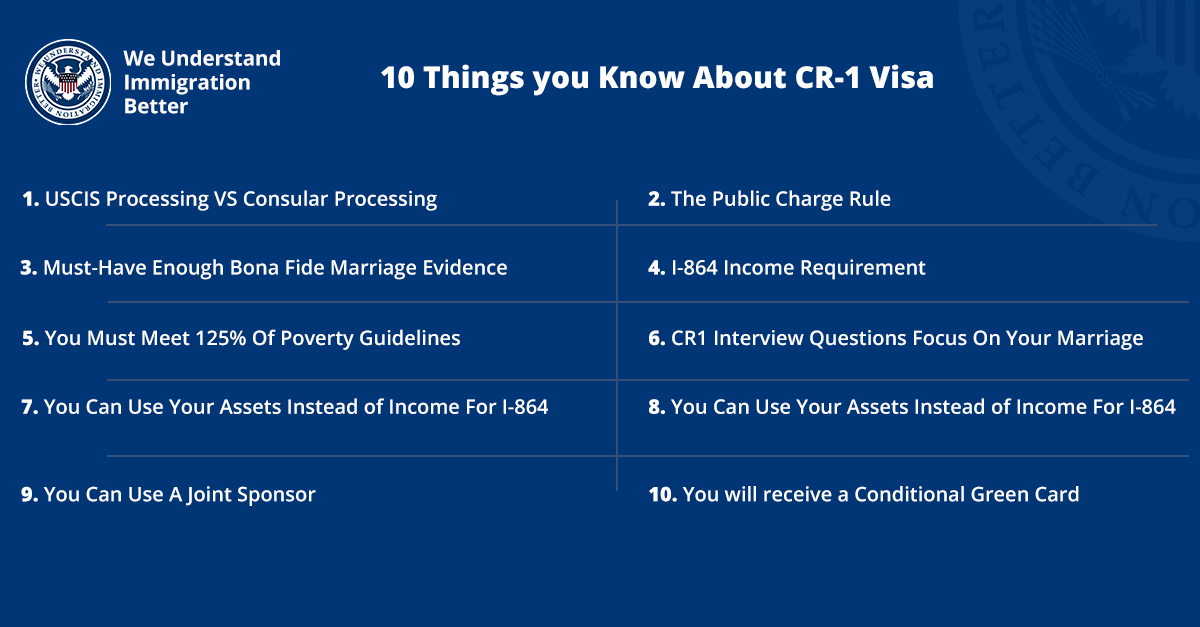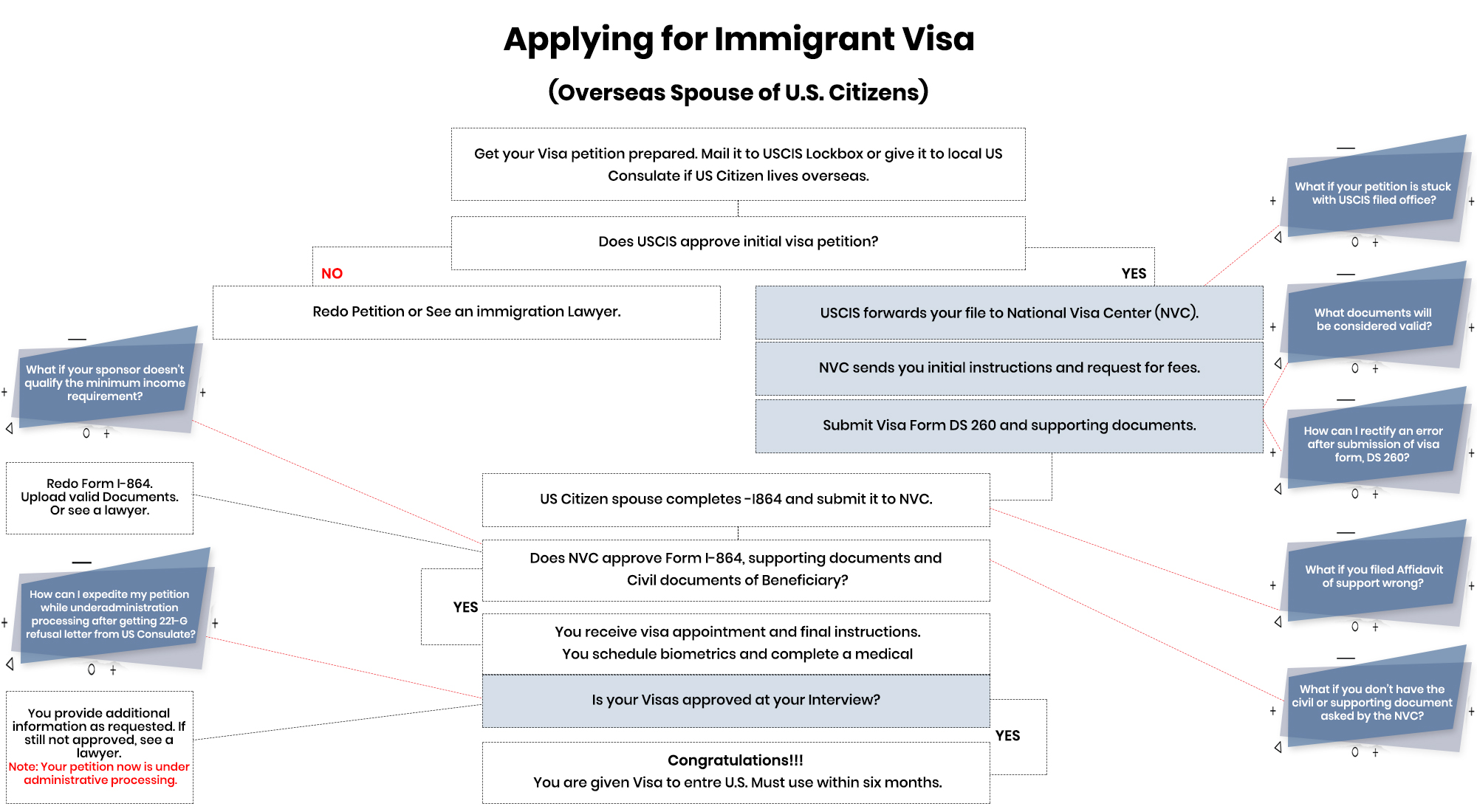10 Things you Know About CR-1 Visa
Home| 10 Things you Know About CR-1 Visa

How Our Lawyers Can Help you in your Fiancé(e) and Spouse Visa
Our Lawyers can advise you, whether it be through a K-1 fiancé(e) visa or Spouse visa. We have successfully handled hundreds of cases and have assisted our clients through every step of the process.From completing the application forms correctly to accompanying you and your spouse to the final immigration interview, we’ve handled it all. The process of sponsoring a relative or soon-to-be spouse can be burdensome but will the help of a qualified attorney, we can help you stay on the right track.
To get in touch with one of our expert attorneys, you can fill out this contact form and schedule your consultation with our office today. Please click here for an Appointment.
10 Things you should know about CR-1 Visa
USCIS Processing VS Consular Processing :There are two options for filing your I-130:
Consular processing
USCIS processing
The difference in what processing you should choose for your I-130 petition depends on where the US citizen spouse lives. If they live in the US, then you must send your petition to USCIS. But if the US petitioner lives abroad, you should submit your petition to the local US consulate.
Must-Have Enough Bona Fide Marriage Evidence : Before you are deemed eligible to file a petition for Alien Fiancé(e) , the petitioner must prove that they are a US citizen. This is required because only US citizens have the privilege to sponsor a fiancé.
You Must Meet 125% Of Poverty Guidelines :Being the part of the application process, the U.S. petitioner has to prove that , according to the numbers set forth within the U.S. Poverty Guidelines, the U.S. sponsor's household income is high enough to support the immigrating family members at 125% or more of U.S. poverty line levels
You Can Use Your Assets Instead of Income For I-864 :If you are having trouble meeting the income requirement, you can use your assets. Using assets is a little more difficult than using W2 income or other forms of income. To use assets instead of income, you must back up the asset valuations with evidence. All assets must also be liquid or convertible to cash within 12 months.
You Can Use A Joint Sponsor :If someone doesn’t meet the income requirements, then they have an option of adding a joint sponsor to their petition. A joint sponsor can be a friend or family member who has US domicile and willing to financially vouch for your petition. But a joint sponsor is not always allowed. It will depend on whether the US Consulate or Embassy will accept one in your case. Make sure you have a back-up plan in case a joint sponsor isn’t accepted for the K1 visa. This can mean getting a second job, using assets, or selling things to build up your savings.
The Public Charge Rule :Public charge basically means that an immigrant is at a higher risk of becoming financially dependent on the government for their wellbeing. To avoid being labelled as a public charge, you must then prove that the US sponsor can financially support you or has the cash reserve to pay for your living expenses if they do not work.
I-864 Income Requirement :Public charge basically means that an immigrant is at a higher risk of becoming financially dependent on the government for their wellbeing. To avoid being labeled as a public charge, you must then prove that the US sponsor can financially support you or has the cash reserve to pay for your living expenses if they do not work.
CR1 Interview Questions Focus On Your Marriage :Your health is important to USCIS and DHS but only to the extent that it could affect the U.S. public. The focus will be on communicable diseases. This means that if you have or had Tuberculosis, this can cause a serious delay for your case. There is a list of specific diseases that the panel physician will look for at the medical exam.
You will receive a Conditional Green Card :The visa interview is really important to your success in obtaining the K1 fiancé visa. This is where you get to show that you are not only eligible for the visa but that you qualify to immigrate to the US. Being nervous about the interview was normal. Preparation is key! You should know what you included in all the forms you submitted. You should know lots of details about your fiancé and their past and you should know what your future plans are with getting married.
You Can Work as Soon as You Enter the U.S. : Finally, if you’ve completed the interview but didn’t get approved right away. Don’t panic! This is also very normal (especially in some countries) and there are several reasons that this can happen. Your petition goes under Administrative Processing, that mean additional review, background check, FBI name check etc.
Why do you need our attorney to help you with your immigration case ?
Our Experienced Attorneys are better equipped to understand and determine how it applies to your specific situation. You will save your time, avoid risks, minimize stress, and receive maximum benefits while working with us, Without our guidance, the process is usually much more overwhelming and the outcome is much more uncertain. The U.S.Immigration law is complex and ever-changing. The decisions and findings are often completely discretionary and highly subjective. A small mistake could end up costing you more money in the long term, result in unnecessary delays, and lead to denial of the petition/application and even deportation from the United States.
We’ve seen so many clients mess up their case because they tried to do things themselves, such as attending a marriage-based green card interview and responding to a Notice of Intent to Deny the visa petition without counsel. If you are not clear exactly what you are doing, get legal advice and representation from an experienced attorney.

